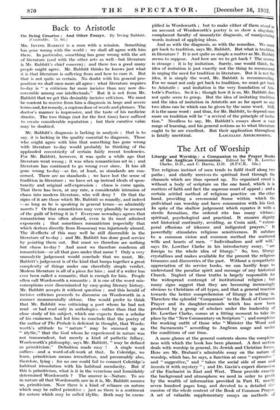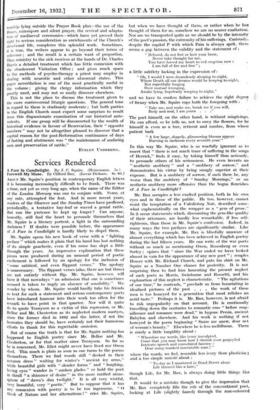The Art of Worship
Liturgy and Worship : a Companion to the Prayer Books of the Anglican Communion. Edited by W. K. Lowther Clarke, D.D., and C. Harris, D.D. (S.P.C.K. 15s.)
THE religious instinct of men tends to fulfil itself along two paths ; and chiefly receives its spiritual food through the channels which are thus opened up. No organized creed is without a body of scripture on the one hand, which is in matters of faith and fact the supreme court of appeal ; and a certain settled method of religious practice on the other hand, providing a ceremonial frame within, which the individual can worship and have communion with his God. In spite of the shallow judgement which equates it with a sterile formalism, the ordered rite has many virtues ; spiritual, psychological and practical. It ensures dignity and historical continuity, avoiding, as Cosin said, " extern- poral effusions of irksome and indigested prayers." It powerfully- stimulates religious sensitiveness. It subdues to a common vision and common method the scattered wills and hearts of- men. " Individualism and self will," says Dr. Lowther Clarke in his introductory essay, " are foreign to the whole idea of liturgy." So, too, liturgy crystallizes and makes available for the present the religious treasures and discoveries of the past. Without a sympathetic appreciation of its service books, we can hardly hope to understand the peculiar spirit and• message of any historical Church. Neglect of these truths is largely responsible for the widespread contempt of institutional religion ; but many signs suggest that they are becoming increasingly obvious to Christians of all types, and that a general reaction towards the better. comprehension of liturgy is setting in. Therefore the splendid "Companion" to the Book of Common Prayer and its daughter-manuals which has now been produced by a group of scholars under the leadership of Dr. Lowther Clarke, comes at a fitting moment to take its place by the " New Commentary on Scripture " ; and completes the working outfit of those who " Minister the Word and the Sacraments " according to Anglican usage and under the conditions of our time.
A mere glance at the general contents shows the complete- ness with which the book has been planned. A first section deals with worship in general, its Jewish and Christian forms. Here are Mr. Brabant's admirable essay on the nature of worship, which has, he says, a function at once " expressive " and " suggestive," and " takes the social side of man and invests it with mystery " ; and Dr. Gavin's expert discussion of the Eucharist in East and West. These provide exactly the background and atmosphere we need in order to profit by the wealth of information provided in Part II, nearly seven hundred pages Iong, and devoted to a detailed dis- cussion of the whole content of the. Book of Common Prayer. A set of valuable supplementary essays on methods of worship lying outside the Prayer Book plan—the use of the Hours, extempore and•silent prayer, the revival and adapta- tion of mediaeval ceremonies—which have yet proved their right to serious consideration as enrichments of the Church's devotional life, completes this splendid work. Sometimes, it is true, the writers appear to go beyond their terms of reference ; and the result is a certain want of proportion. Thus ministry to the sick receives at the hands of Dr. Charles Harris a detailed treatment which has little connexion with the obsolescent Visitation Office ; and gives much space to the methods of psycho-therapy a priest may employ in dealing with neurotic and other abnormal states. This paper nevertheless is one of the most practically useful in the volume ; giving the clergy information which they greatly need, and may not so easily discover elsewhere.
This is not the place to discuss the treatment given to the more controversial liturgic questions. The general tone in regard to these is studiously moderate ; but both parties in the English Church must expect some surprises to result from this dispassionate examination of our historical ante- cedents. If one group will be disconcerted by the wealth of historical evidence in favour of Reservation, their " opposite numbers " may not be altogether pleased to discover that a capital reason,for the post-Reformation continuance of days of fasting and abstinence was " the maintenance of seafaring men and preservation of cattle."
EVELYN UNDERIIILL.































 Previous page
Previous page